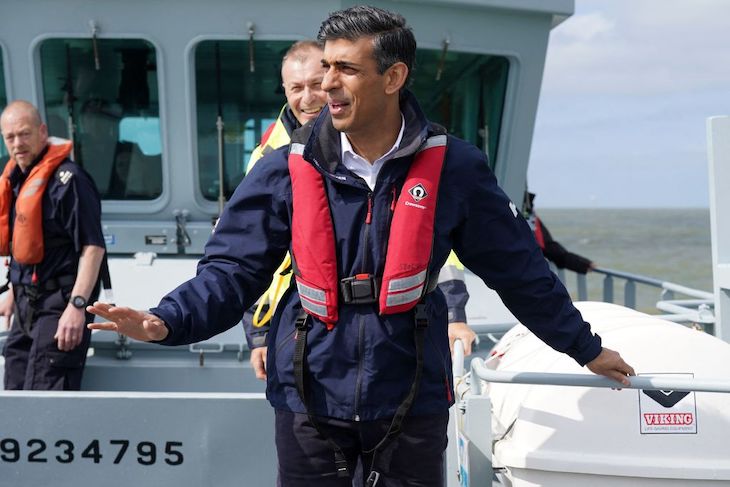When Rishi Sunak replaced Liz Truss in Downing Street last autumn, fundamentalism gave way to incrementalism. So far, the results have been suitably unspectacular: a nudging down of the inflation number more slowly than anyone envisaged; the bare avoidance of outright recession; debt at best stuck as a share of GDP; NHS waiting times that are only very slightly less appalling than they were.
According to new polling from Ipsos UK, the electorate is so far unimpressed with these baby steps and generally believes Labour could do a better job.
Today Sunak travelled to Dover to give us an update on the last of his five key pledges – to ‘stop the boats’. In short, he hasn’t. Some 7,610 people arrived in the UK illegally via small boat in the first five months of the year – and these are not even the peak months for the people trafficking trade.
But for a prime minister once again dressed like Succession‘s Kendall Roy at a corporate away day – dark trousers, open-necked white shirt, no jacket – this amounted to something to work with given that last year’s January to end-of-May figure was 9,575. So Sunak pointed out that a 20 per cent reduction had been achieved and claimed his policy was ‘starting to work’.
Sunak was once again dressed like Succession‘s Kendall Roy at a corporate away day
Sceptical attendees at his press conference pointed out quite reasonably that weather in the Channel was pretty blowy this spring. They pondered if that could be a contributory factor in the PM’s magnificent attainment of only the second worst figures on record for small boat arrivals.
Sunak pointed out that crossings into mainland Europe had risen by almost a third in the same period, though he did not come armed with a Mediterranean weather chart.
What he did have up his sleeve was a number for returns of Albanian nationals of 1,800 and rising, along with a plummeting acceptance rate of asylum applications from Albanians – now down below two per cent. Last year, Albanians made up around a third of Channel-crossers. This year the proportion is running at between one and two per cent.
This fall-off of Albanian arrivals is big enough to account for the entire reduction from the 2022 peak so far achieved. Sunak quite reasonably zoomed in on a key plank of his policy that does seem to have been vindicated by the ebbing away of arrivals from this one national group: the power of a deterrent effect.
‘When you do demonstrate to people that they won’t get to stay and they will be returned you see the numbers come down. It’s proof that the deterrent effect will work,’ he said.
This is in my view a well-founded assertion. Contrary to claims by those on the left, information about what is and isn’t working in terms of exploiting the UK asylum system does travel very quickly to the camps around Calais and Dunkirk. Albanians have stopped coming because Albanians are now being efficiently returned.
If the Sunak policy that illegal arrivals from other nationalities will not get to stay comes properly into effect then we can indeed expect to see a similarly rapid general tailing off in the small boat traffic. Nobody is going to pay £3,000 for a place in a boat only to end up back in their own country or a third country such as Rwanda.
For this to happen, Sunak needs to conclude returns agreements with other countries of origin or to get the Rwanda scheme up and running at scale. He will require the Illegal Migration Bill to make its way through the House of Lords as smoothly as it got through the Commons, which must be in some doubt.
If and when the legislation is on the statue book – and when other legal impediments to the Rwanda scheme are out of the way – Sunak seems set to be ready to fully exploit his new power. The PM revealed he is holding high-powered meetings with key civil servants twice a week to ensure that detention capacity is expanded and court capacity is sufficient to start removing illegal arrivals as soon as his new law comes on stream.
The illegal immigration/abuse of asylum racket is only about ten per cent of the UK’s mass immigration phenomenon. But in the eyes of much of the electorate it is ugly and insulting.
By the time of the next election, Rishi Sunak may have succeeded in getting a grip on it where Boris Johnson so embarrassingly failed. Given that overall legal and planned net immigration will probably still be running at around half a million this will be far from sufficient to put many migration-sceptic voters into a positively cheerful mood. But it will be better than nothing. When an incrementalist is in charge that may be as good as it ever gets.







Comments